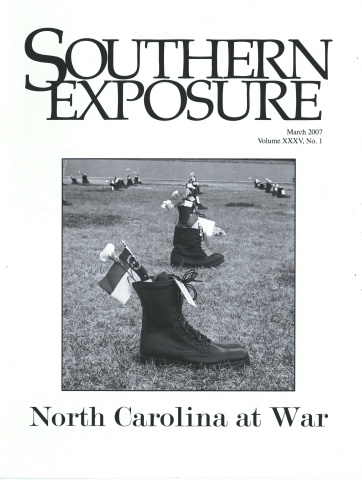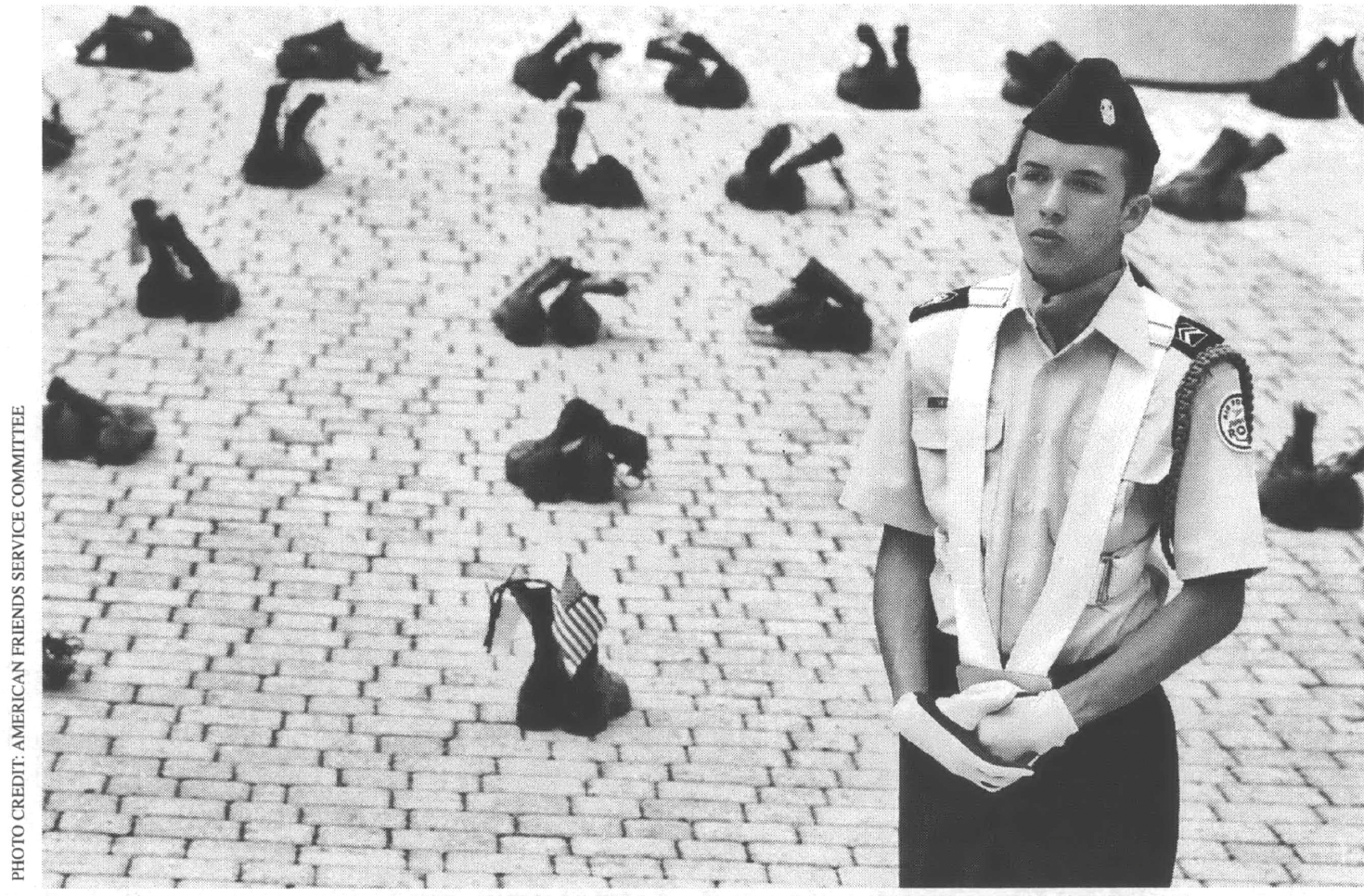
This article originally appeared in Southern Exposure Vol. 35 No. 1, "North Carolina at War." Find more from that issue here.
Billboards across the state declare North Carolina’s new motto: “Most military-friendly state.” North Carolina has long been hospitable to the nation’s armed forces, serving as the headquarters of key military bases and the home of many soldiers, deeply influencing the politics, economics and culture of the state.
Now, at the fourth anniversary of the Iraq war and as the country becomes increasingly entangled in conflicts abroad, Gov. Mike Easley and state officials seek to expand North Carolina’s military ties. Last year, leaders successfully lobbied for North Carolina bases to expand in the latest round of base realignment, even as the nation’s net base forces declined. In December, Lt. Governor Bev Purdue announced the launch of the North Carolina Military Foundation, which aims to boost the state’s share of defense dollars and jobs.
North Carolina leaders paint rosy projections of the benefits from deepening the state’s links to the military. But policy-makers have rarely been asked: what are the costs—economic and social—of making our state increasingly dependent on the business of war?
Recent news headlines have revealed a darker side to North Carolina’s military ties, events that have damaged the state’s global reputation:
* In the wake of the wars in Afghanistan and Iraq, North Carolina communities and base towns have been devastated and destabilized by a steady stream of war casualties, including the state’s injured soldiers returning to overburdened veteran medical facilities;
* In January 2007, the U.S. Supreme Court upheld the state’s jurisdiction in a lawsuit filed by surviving family members of Blackwater USA employees, killed in 2004 by a mob in Fallujah;
* Also in January, international attention focused on Johnston County Airport and North Carolina pilots believed to be connected to the kidnapping and torture of Khaled el-Masri, an innocent German citizen. German officials are seeking extradition of the pilots in the investigation of the CIA’s “extraordinary rendition” flights of terror suspects.
* In February this year, the U.S. District Court in Raleigh sentenced CIA contractor David Passaro of Lillington, N.C., to eight years and four months in prison for beating and killing an Afghan detainee in 2003.
Banking on military bases and defense dollars is a risky economic strategy: base towns rise and fall by constantly shifting troops deployments; decisions about base sizes and defense contracts often hinge on back-room Washington deal-making. Thousands of livelihoods and lives in our state are increasingly dependent on the White House and Congress and their decision to take our country to war.
Ironically, North Carolina’s decision to become more deeply enmeshed in what President Dwight D. Eisenhower called “the military-industrial complex” comes as public opposition to our country’s current wars is growing in the state and region.
An October 2006 poll by the Institute for Southern Studies found that 57% of residents in 13 Southern states felt the U.S. “should have stayed out of Iraq.” This finding was echoed in January 2007, when a Public Policy Polling survey found 57% of North Carolinians are opposed to escalating the Iraq war, and a plurality—37%—want U.S. troops to come home “immediately.” Anti-war sentiment is even felt in places like Fayetteville, home of Fort Bragg: a 2005 poll found most respondents (44%) thought the Iraq war “wasn’t worth it.”
Which raises a deeper question for our state: aside from the economic and social costs of being increasingly linked to—and impacted by—war, what are the moral implications? In an interview in this report, North Carolina native Jimmy Massey—an Iraq war veteran and former Marine recruiter - doesn’t mince words: “If money is coming from these industries . . . the people of North Carolina have blood on their hands.”
As the casualties and money needed for war escalate and opposition grows in North Carolina and beyond, we hope this report helps ignite a long-overdue conversation in our state: what are the costs of being “the most military-friendly state,” and what is best for the future of North Carolina?
Tags
Elena Everett
Elena Everett is a filmmaker and program associate at the Institute for Southern Studies. She received her interdisciplinary B.A. in media studies and public policy from North Carolina State University in 2005. (2007)
Chris Kromm
Chris Kromm is executive director of the Institute for Southern Studies and publisher of the Institute's online magazine, Facing South.


